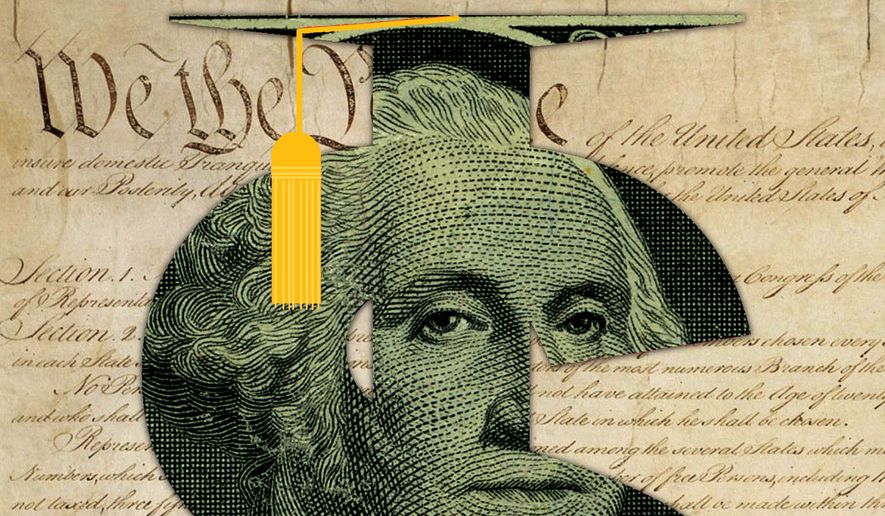OPINION:
The long-awaited student loan forgiveness plan from President Biden has finally arrived, but his own Department of Justice’s Office of Legal Counsel (OLC) may be undermining his chance for success by ignoring a critical constitutional doctrine in its assessment of the policy. This is especially problematic because the policy is almost certain to end up in the courts facing judicial review.
Mr. Biden and his team of lawyers are relying upon the Higher Education Relief Opportunities for Students Act of 2003 (HEROES Act), which grants the secretary of education authority to waive rules relating to student financial aid programs in times of war and national emergency. The administration has argued that the national emergency declared for the COVID-19 pandemic qualifies as a national emergency despite the fact Mr. Biden recently announced the pandemic was over.
The OLC, an office within DOJ, which will be tasked with defending this policy in court, supported the Biden administration’s position in an Aug. 23 memorandum opinion for the general counsel for the Department of Education that makes inadequate arguments.
While the OLC memo says the secretary of education can implement the loan forgiveness program unilaterally because it would target those who suffered financial hardship due to the COVID-19 “national emergency,” it ignores the Major Questions Doctrine, which requires a reviewing court to strike down a policy if (1) the claim of authority is of vast economic or political significance, and (2) Congress has not clearly empowered the agency with such authority.
In other words, while federal agencies can sometimes waive rules and regulations, they can do so only when the change does not have a significant economic or political impact — or Congress has expressly authorized such an act. Mr. Biden’s student loan forgiveness plan, which is already facing at least four legal challenges, implicates the doctrine because the plan will cost hundreds of billions of dollars, and is politically and nationally significant, affecting over 40 million borrowers. Allowing such a policy to be unilaterally implemented would arm the secretary of education with powers not expressing granted by Congress.
In what appears to be an anticipatory argument for future judicial review, the OLC memorandum also plays fast and loose with legislative history and the interpretation of the statutes and regulations at issue. The legislative history it cites in support of its position is weak, and includes only three vague quotes about deferring debt during national emergencies while remaining silent on the issue of waiver.
“We have no statements from the brief floor debate on the Act expressly rejecting the Secretary’s power to cancel student loan debt under the HEROES Act. … A few statements suggest that some Members of Congress viewed the Act primarily as authorizing the Secretary to defer payments.”
After two quotes from former House Speakers John Boehner and Paul Ryan, and a third from Rep. Johnny Isakson specifically referencing deferral, but not waiver, the opinion continues:
“But these statements do not demonstrate that these Members viewed the HEROES Act as preventing debt cancellation as an act of the Secretary’s discretion to accomplish objectives of the Act. An alternative explanation is that [Congress] simply did not focus on this particular application when they enacted the statute.”
There is nothing in these or any other statements in the legislative history indicating that Congress meant to prevent the secretary from reducing or canceling debt if the secretary “deems” such cancellations or reductions “necessary” to “ensure” that “affected individuals are not placed in a worse position financially in relation to [their] financial assistance because of their status as affected individuals.”
This is shaky logic at best, and at worst, in direct conflict with the doctrine, which requires a reviewing court find that Congress affirmatively supports the agency’s authority in question.
Following its cursory review, OLC also declared that the requirement that the education secretary find that the action is “necessary” does not actually require that the action be necessary, but rather just “appropriate.” OLC notes this is acceptable because apparently the Department of Education has previously acted similarly by using the “appropriate” standard under the authority. Such an argument, however, is likely to face tough judicial scrutiny once it is under review by the courts.
Even if the plan survives in the lower courts, there is a high likelihood that the Supreme Court will strike down the Department of Education’s actions. Since his 2019 dissenting opinion in Gundy v. United States, Justice Neil Gorsuch has been searching for the right case to limit unilateral administrative power. The essence of Mr. Gorsuch’s concern in that case was unelected bureaucrats drafting laws without checks on such power, and with two new conservative justices joining the court since this time, Mr. Gorsuch could finally have his chance to limit presidential agency power, starting with Mr. Biden’s apparent overreach here.
The Department of Justice’s justifications for the constitutionality of this action have legal scholars from across the political spectrum speculating it will fail. Should the decision reach the Supreme Court, it could backfire with a decision that limits Mr. Biden’s presidential power — and the power of future presidents.
• Shawn M. Flynn is a Georgetown Law School graduate who served as a special assistant U.S. attorney for the Eastern District of Virginia, 2019-2020. Jared J. Roberts is a graduate of Case Western Reserve University School of Law. They both now practice constitutional law for the Binnall Law Group.




Please read our comment policy before commenting.